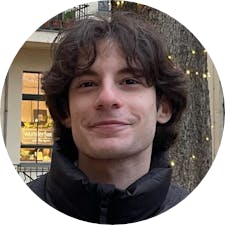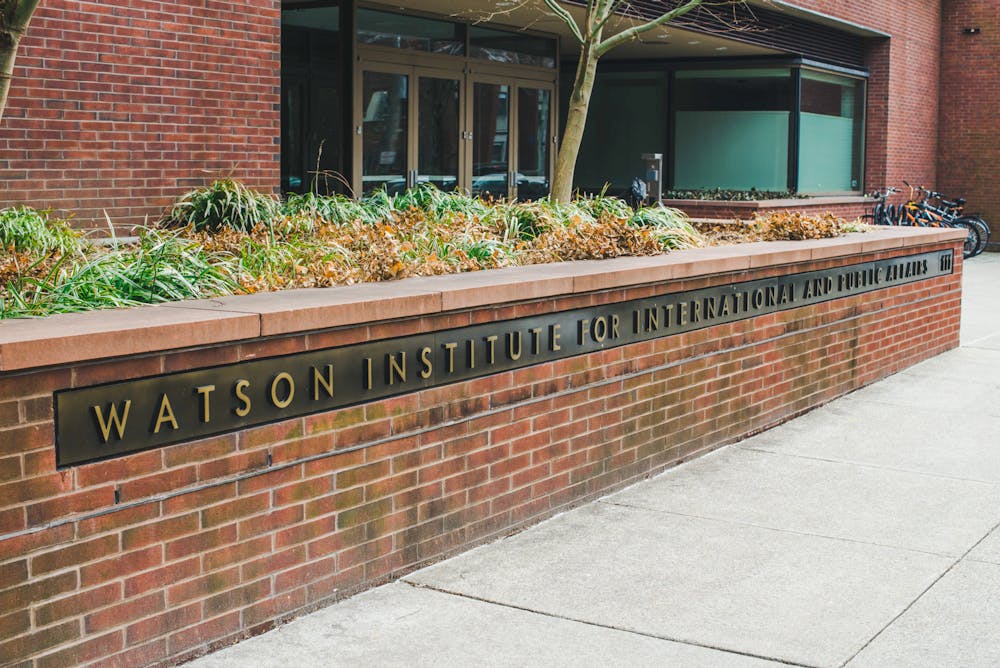The Department of Slavic Studies held a panel discussion Wednesday titled “From the Maidan Revolution to Russia’s Invasion of Ukraine: Art, Activism and Humanitarian Crisis.”
Held in the Watson Institute for International and Public Affairs, the event was moderated by Paulina Duda, visiting assistant professor of Slavic Studies, and included three panelists: Anthony Levitas, senior fellow in International and Public Affairs; Michal Oklot, associate professor of Slavic Studies; and guest speaker Jessica Zychowicz, director of Fulbright Ukraine and the head of the Institute of International Education’s Kyiv office.
“What our speakers have in common is (their) extensive experience in the region, both in Poland and Ukraine,” Duda said, “as well as their efforts to really bring their research or knowledge outside of the University walls.”
The goal of the panel, according to the event’s description, was to provide its attendees further insight into the “current political, cultural and social developments” in Ukraine and Poland through the “context of the 2014 Maidan Revolution in Ukraine.”
The Maidan Revolution — colloquially referred to as the Revolution of Dignity — took place in Ukraine in February 2014 following the end of the Euromaidan protests. These protests began in 2013 in response to then-Ukrainian President Viktor Yanukovych’s decision to create closer ties with Russia and the Eurasian Economic Union as opposed to signing a political association agreement with the European Union. The revolution culminated in the ousting of Yanukovych and a partial reformation of the Ukrainian government.
The discussion began with introductory remarks from Zychowicz, whose academic work focuses on women’s rights and gender activism in Ukraine. Zychowicz opened by posing the question, “What is the difference between revolution and war? And are we still in the revolution right now?”
The “Maidan (Revolution) is back again, but it’s on a larger scale,” Zychowicz said. “If we think about current events happening right now as a revolution and not only a war, we can start to understand more and more what the global ramifications and the discussions around it — the attack on our values, attack on our democracy — might mean to people who are taking part in” the conflict.
Zychowicz works closely with art collectives in Ukraine that are exploring concepts of violence in revolutionary contexts. These collectives have been discussing ideas that emerged in Ukraine around 2013, such as anti-discrimination laws and human rights strategy, which are “still on the table today … (and) central to what Ukraine is fighting for right now,” she said.
Art collectives in Ukraine are dealing with censorship, Zychowicz said. Her work aims to bring artists and human rights “back on the table as a central concern.”
Levitas spoke further on the involvement of other nations in the current conflict, specifically the “outpouring of sympathy and goodwill towards Ukrainians in Poland.” Poland has taken in about 1.9 million Ukrainian refugees to date, Levitas explained, which makes up about five percent of the total Polish population.
Relations between Poland and Ukraine “historically have not been all sweetness and joy,” Levitas added, citing the ethnic cleansing in both countries in 1919 and the difficulties of forming the Ukrainian national state in the 1940s as a result of “bitter fights” with Poland and Russia.
Poland’s recent support for Ukrainians is a “rather remarkable and a historical shift,” Levitas said.
Levitas provided historical context for Poland’s current support of Ukrainians. In the 1980s, Poland put forward “an extremely extensive packet of reform for a local government building,” Levitas said. Poles demanded that “local governments be built from the bottom up and that the first democratically elected entities be municipalities … (which would) perform significant public functions.”
“It is those municipalities now that have provided the bulk of the organized support” for Ukraine, Levitas said. “The (Association) of Polish Cities … is pushing forward those legislative issues that they think need to be resolved to make the absorption of refugees possible.”
Levitas added that Ukraine failed to achieve a similar government in its moment of national independence, which led to “incredibly fragmented” first-tier governments and an “ambiguous structure” for middle-tier governments.
“For the last 30 years, Ukrainians have been trying to dig themselves out of that hole,” he said. Architects of Polish local government reform, like Levitas himself who has worked on finance and governance issues throughout Eastern Europe, have been deeply involved in helping local Ukrainian governments “learn how to budget, to create new systems of dealing with public services, with changing legislation about revenue and expenditures.”
Debates over how to “break out of this waterfall of authority coming from the central level … and how to deal with 10,000 village local governments that are too small to perform serious social sector functions” have been complicated by the territorial, linguistic and socioeconomic divisions within Ukraine, according to Levitas.
The Donbas, a region in southeastern Ukraine, is the “heart of blight, despair, and the heart of industrial” issues, which has led to tensions with western Ukraine, a region that is more easily integrating with the European economy, Levitas added.
The “resentment” that comes in the Donbas has made Ukrainian citizens worried about discussions of decentralization, as this could mean giving “regional levels of government (in Ukraine) the power to secede or the power to run their own show in ways that threaten the unity” of the Ukrainian state, he added.
Despite these internal governmental struggles, “Ukrainian cities have performed remarkably well” in the war with Russia, Levitas said. “The degree of self-mobilization, self-organization … has been important.”
Oklot spoke further on the Polish response to the refugee crisis. He opened by quoting British journalist Lancelot Lawton who — 87 years ago — explained that “the chief problem in Europe today is the Ukrainian problem. Of deep concern to this country because of its effect upon European peace and diplomacy, it is at the same time closely bound with European interests of a very vital nature.”
Oklot went on to discuss the international “suppression of Ukrainian nationality” through means including Europe’s passive acceptance of the Russian annexation of Crimea in 2014.
“What we can and should do now is try to help,” Oklot said. “Besides political responses to Russia’s invasion, the immediate concern is the humanitarian refugee crisis.”
Poland is expected to become the country hosting the most refugees in the world by the end of March, which places strain on those providing aid, Oklot said.
Poland has recently passed legislation to better accommodate Ukrainian refugees, including policies that will allow refugees to legally stay in the country for a year and a half, extend their visas, receive free medical treatment and have access to education, according to Oklot.
At the same time, Poland is “a polarized country,” Oklot added. “Right-wing media (sources) are arguing that we cannot allow our history to be erased in Poland,” citing the massacres of Poles by the Ukrainian Insurgent Army in Volhynia, a European region located between southeastern Poland, southwestern Belarus and western Ukraine.
Oklot also discussed criticisms of the Polish government and its handling of the refugee crisis. Most of the aid from Poland has come from “grassroots organizations and individual people” rather than the government administration, which has only recently started cooperating “with local authorities … who still have the first responsibility of organizing aid,” Oklot said.
Immigration specialists recommend that the Polish government lower its own expectations and start working on relocating refugees within the European Union, according to Oklot. He believes Poland must also open centers of temporary stays and “establish a crisis center (with) competent management.” Governmental funding is lacking and “essential,” he added.
The “Polish government has to drop its authoritarian inclination, which violates democratic standards, in order to progress both financially and politically,” Oklot said.
Oklot emphasized the “overshadowed” refugee crisis on the Poland-Belarus border, where Polish border guards “are helping (some Belarusian refugees) as much as they can” but simultaneously “detaining others.”
“On one border, Poland sets a humanitarian example — or is at least trying to,” Oklot said. “On the other, it violated international and ecological law on protection against the effects of war and violence. … What makes the war in Ukraine different from the war in Yemen, Afghanistan, Syria (and) Iraq? The bombs are everywhere the same.”
Zychowicz believes that “a lot of the campaigning around the refugees is really about … this pitch for Ukraine statehood to be part of the European continent.” She also thinks this has contributed to the differences in treatment between refugees from Ukraine and other countries.
Some members of Zychowicz’s staff, many of whom are Ukrainian, have also chosen to stay in Ukraine during the conflict, either as a result of patriotism or martial law, Zychowicz said.
“There is a sense of duty and defense,” Zychowicz added. “But there is also the problem now … of closed cities, where civilians are trapped without medicine or food. … There’s a big difference between choosing to stay and being forced to stay.”
Zychowicz emphasized that those in the West are in a position to advocate for humanitarian corridors in these closed cities.
Sophie Lazar GS, who identifies as a Ukrainian American, found the panel discussion “really enlightening,” especially due to its inclusion of a Polish perspective.
“It just feels very special,” she said, “that Brown is taking the time and energy to talk about this issue.”

Alex Nadirashvili was the managing editor of multimedia and social media for The Brown Daily Herald's 133rd Editorial Board. As a former University News editor, he covered faculty, higher education and student life, though his proudest legacy is The Brown Daily Herald TikTok account.





